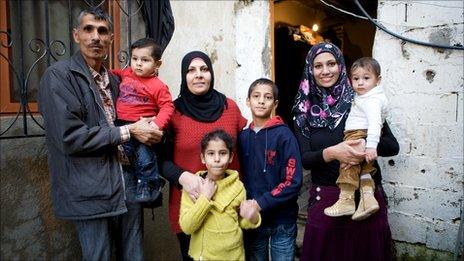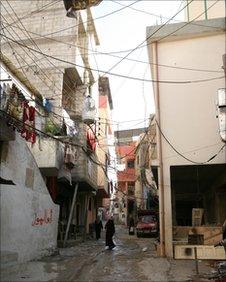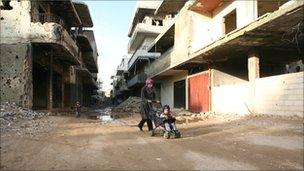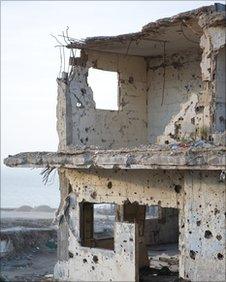Palestinian plight in northern Lebanon refugee camps
- Published

The Sabani family lost everything when they fled the fighting in 2007 and now live in a tiny, two-roomed home in Badawi refugee camp
It is sometimes controversially said that Palestinian refugees in Lebanon live in worse conditions than those during the Israeli occupation in Gaza.
There is no better place to witness and document the plight of Lebanon's refugees than Nahr al-Bared.
It was such conditions that contributed to the destruction of the refugee camp, in 2007, as troops from the Lebanese army fought with Islamist militants.
In May of that year, fierce fighting erupted here - a sprawling Palestinian refugee camp near Tripoli in northern Lebanon.
The Lebanese army bombarded militants from Fatah al-Islam, who had taken root in the squalid, hopeless conditions.
The camp was destroyed and 27,000 Palestinian refugees fled, among them one remarkable family.
Modest ambitions
A few miles from what used to be their home in Nahr al-Bared, we met the Sabanis.
In 2007 they lost everything when they fled the fighting.

It is thought there are about 450,000 Palestinians living in Lebanon
This proud and resilient family, of two adults and six children, live in a tiny, two-roomed home in another crowded "camp" called Badawi.
Mr and Mrs Sabani, whose parents had initially fled to Lebanon in 1948 from what is now northern Israel, have only modest ambitions, principally to return to their former home.
"My big worry, for my children, is that we're going to be moved from place to place," said Boshra al-Akli Sabani as her husband bemoaned the lack of jobs and other opportunities.
"Four years ago we had to leave our previous home and everything we had there. Who knows what the future holds? It's no way to live… Yes, I'm very worried."
Option to emigrate
Like all other Palestinians here, the Sabanis cannot own property, they are denied access to state health and education facilities and there are still many professions which they cannot join.
Take Haitham Atef Musa. He defied the system to become a qualified dentist.

Palestinians in refugee camps are denied access to state health and education facilities
But in Lebanon, he can only work here in the refugee camps, because he is still not allowed to join the syndicates - or professional bodies - which would allow him to practice in wider Lebanese society.
"Although I have all the certificates that they want and I've passed all of their tests, they still refuse me," said Haitham.
He acknowledged that perhaps the only realistic option left open to him was to emigrate to somewhere like Canada, where he is pretty confident he would find work.
It is thought there are about 450,000 Palestinians and their descendants living in Lebanon - refugees from the 1948 Israeli-Arab war.
Radical Islam
In many other Middle Eastern countries, like Syria and Jordan, Palestinian refugees are afforded various political rights, social services and other amenities.
In Lebanon, says Professor Hilal Khashan, from Beirut's American University, they are treated like pariahs for fear that to give them basic rights could upset the country's delicate religious and political balance.

Some parts of Nahr al-Bared are being re-built but much remains in ruins
"The Palestinians are unwanted in Lebanon," he said. "To rebuild the camp at Nahr al-Bared means giving the Palestinians hope. The government doesn't want to give them any hope, it just wants them to leave."
Going back today, some parts of Nahr al-Bared are being re-built but most of it remains in ruins.
The Lebanese government has, belatedly, introduced very limited improvements, allowing Palestinians to work, in some parts of the private sector.
But that will not change much and - walking through the crowded streets of refugee camps like Badawi and the bombed-out ruins of Nahr al-Bared - there is always the danger that the camps and their downtrodden residents could again turn to radical Islam.
- Published4 August 2010
- Published4 August 2010